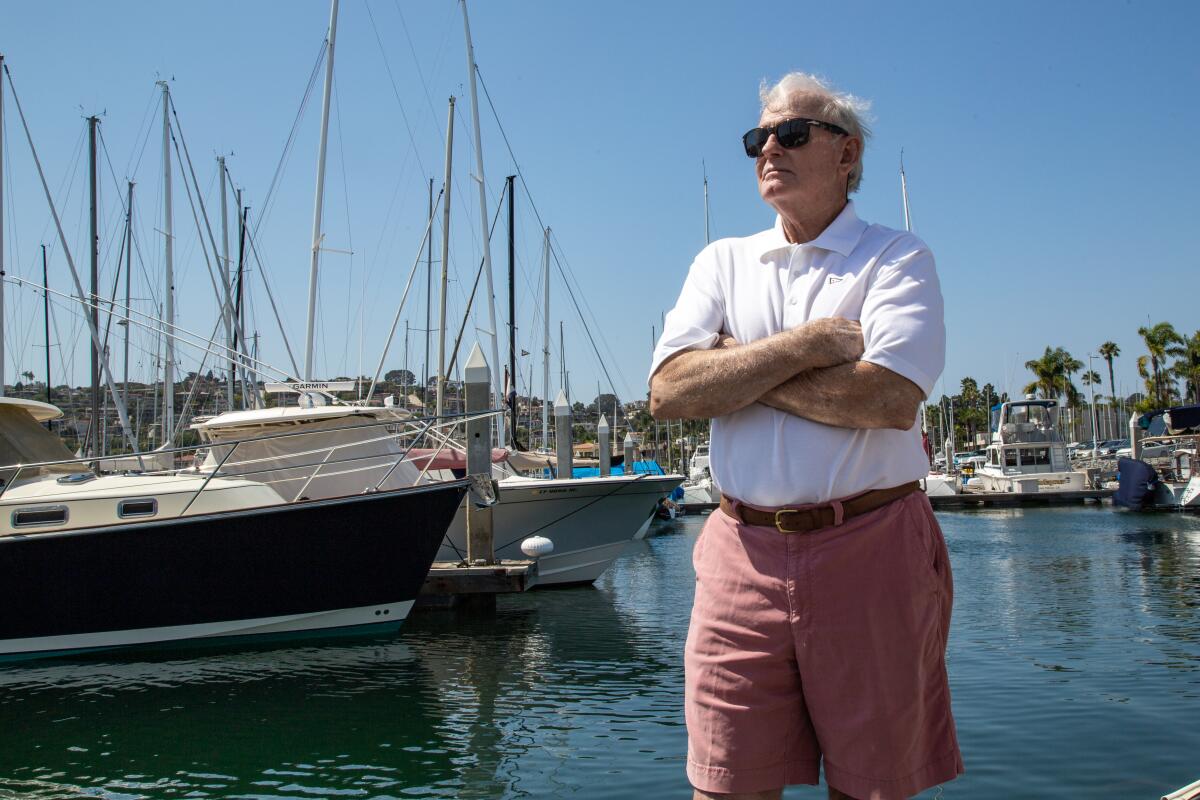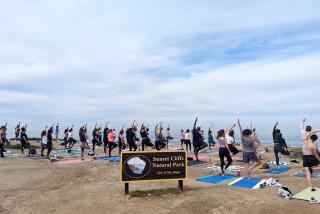Boaters push to lift COVID-19 restriction on who can come aboard

Boaters in San Diego County are working with officials to amend a public health order they say is unfair because it restricts who can come aboard private vessels during the pandemic, but does not apply to commercial operations.
“With sports fishing, you can have 60 guys who don’t know each other, and they’re standing shoulder to shoulder on the rail, and that’s OK,” said Brian Thomas, commodore of the San Diego Yacht Club. “But you can’t do that on your own private boat with your friends.”
As county health officials first began taking aggressive steps to stop the spread of the novel coronavirus, they enacted an order on April 9 prohibiting all active sport activities, including boating, for recreational purposes. A May 1 revision eased the restriction to allow recreational boating, but only if everybody on board was from the same household.
The rule doesn’t apply to commercial ventures such as rental businesses, meaning a boat owner cannot take his friends out on his own boat, but can take them out on a rental, Thomas said.
Bill Edwards, rear commodore of the San Diego Assn. of Yacht Clubs, was among several boaters who brought up the issue at the Aug. 4 county Board of Supervisors meeting. He noted that county Public Health Officer Wilma Wooten had acknowledged there had not been a single coronavirus case traced to boating.
Edwards is chair of the association’s Boating Freedom Committee, formed this year to address the restriction. The committee has worked with the San Diego Port Tenants Assn. to create safety protocols that recreational boaters would follow if allowed to sail with non-household members.
The protocols would be distributed and posted on docks and would call for a person in charge of a boat to log the names of all occupants, check people’s health and require masks, Edwards said.
After hearing several people speak on the issue Aug. 4, Supervisor Dianne Jacob agreed the rule did appear to be inconsistent, and she questioned whether the county had the authority to amend it.
A staff member said they would have to check with the state.
After recently submitting the proposed protocols to the state, the county is awaiting a response. As of Friday, the county had not heard back.
Edwards acknowledges that the plight of sailors in yacht clubs may not get much sympathy from many people.
“A lot of us are feeling that’s part of the problem, that we’re just snooty people, and so what that they can’t take their boats out?” he said. “It’s way more than that.”
Besides the fact that not every member of a yacht club is a millionaire with a super yacht, Edwards said the restriction also affects people who live 25 miles from the shore and bring their boats to launches by trailer for a day of fishing with their buddies.
The association represents boating organizations and eight main clubs, from the Chula Vista Yacht Club in South Bay to the Oceanside Yacht Club in North County.
Thomas said the 135-year-old San Diego Yacht Club, which once won the America’s Cup, has canceled almost all its boat races, as have all other clubs in the county.
“Right now we’re doing some sailboat racing, but it’s all strictly with people from the same household or [on one-person] Sabots, Lasers and Fins,” he said.
Lisa Clements, vice commodore of Silvergate Yacht Club, spoke at the Aug. 4 meeting and told supervisors that the public health order had forced her club to cancel its 60-year-old Wheelchair Regatta, an annual event where large power boats gave 90-minute tours to more than 400 disabled people and their caregivers.
The club also had to cancel its America’s Schooner Cup regatta, which each year raises between $30,000 and $35,000 for the Navy Marine Corps Relief Society, she said.
Mark Mallaby, commodore of the Oceanside Yacht Club, said the restriction has eliminated many races, including the popular Wednesday night twilight series with full crews.
He said the canceled weekly event meant fewer visitors to the clubhouse, meaning fewer people spending money at the restaurant and bar.
“It is frustrating, because there’s not a whole lot of logic to it,” he said about the rule. “If I wanted to take my friends out sailing, they could get in the car with me and I could take them to the yacht club. I could sit at a table with them and have a drink. I could walk with them to the dock and then sit on the boat with them. But we can’t go sailing.”
Mallaby, who grew up in Sydney, Australia, has raced sailboats for more than 40 years and owns a 35-foot boat that requires a crew. While he can’t race from his own club, he has participated in regattas this summer in Orange County, which doesn’t have the same restriction.
“We’re not out to create a problem, but what we would like is a modicum of fairness and modicum of common sense,” he said.
At the Aug. 4 county meeting, a staff member said there was some logic behind having different rules for commercial and non-commercial boaters. According to the staffer, commercial boaters would have a person on board who would be accountable for guests following rules, while recreational boaters would not.
Mallaby disagreed, saying that sailors generally are responsible people who follow rules.
“Sailboat racers and sailors in general are pretty good at self-governance,” he said. “Our sport has no umpires. We’re a very independent and, generally speaking, rule-following people.”
Despite the frustration the rule has caused boaters, Mallaby said there has been a surprising silver lining for the club.
“Our small-boat program has exploded under COVID,” he said.
The club offers beginner and intermediate classes that are open to the public, and it has added two more junior sailing classes this summer.
More to Read
Sign up for Essential California
The most important California stories and recommendations in your inbox every morning.
You may occasionally receive promotional content from the Los Angeles Times.











